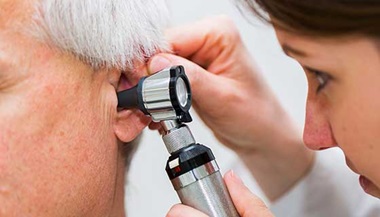Over-the-Counter Hearing Aids: Frequently Asked Questions
The Food and Drug Administration’s recent rule has expanded access to hearing aids by creating a new category of hearing aids: over-the-counter (OTC) hearing aids. They can be purchased by consumers in retail stores and online and do not require a physician or audiologist visit before purchase. Although involvement of an audiologist is not required, people interested in OTC hearing aids may have many questions that could be answered by a professional. The Johns Hopkins Division of Audiology offers guidance in helping you decide whether an OTC hearing aid is right for you and how to choose one.
What are OTC hearing aids?
OTC hearing aids were implemented to help assist adults with a perceived mild-to-moderate degree of hearing loss and who may not need hearing assistance in every listening situation. An OTC hearing aid may help enhance speech and provide improvements in communication for people who are able to hear well generally but experience occasional difficulty hearing.
Devices traditionally known as hearing aids that are purchased through an audiologist are now labeled by the FDA as “prescription hearing aids.” OTC hearing aids have limited loudness output and features compared with prescription hearing aids. Both categories of devices share some of the same features, however the amount of customization, functions, and computer processing varies greatly between them. The variety, quality and functions of OTC hearing aids changes weekly as new OTC hearing aids enter the market.
Why should I see an audiologist before getting an OTC hearing aid?
An audiologist is a licensed, certified professional who specializes in helping patients with hearing loss. While OTC devices do not require a diagnostic hearing test, they do rely on the consumer to determine if they have perceived mild to moderate hearing loss. Many people are not able to accurately determine their degree of hearing loss. A diagnostic hearing test completed with an audiologist will provide accurate information on both the degree and type of hearing loss.
An audiologist can then help you determine if OTC or prescription hearing aids are right for your communication needs, or if you need a consultation with an otologist (ear physician). The hearing test can also be useful to self-fit an OTC device or to precisely program a prescription device. There is an overwhelming amount of information available on hearing technologies, and your audiologist can provide clarity and direction to ease you through the process to improved communication.
Are hearing tests covered by health insurance?
Yes, the majority of health insurances cover hearing testing. The billing code, or CPT code used by an audiologist for a diagnostic hearing test is 92557 (comprehensive audiologic evaluation).
Can children use OTC hearing aids?
No, OTC hearing aids are for people over the age of 18. Children have specific needs when it comes to prescription hearing aids related to their growth and development. Infants and young children need new ear pieces as they grow and the size of the ear changes. Children require special techniques performed by a licensed, trained audiologist to properly program hearing aids to accurate settings. They also need routine follow-up to monitor for progress and to ensure speech and language milestones are met.
Does health insurance cover hearing aids?
Coverage for hearing aids varies between insurance companies and plans. Some insurances provide coverage for prescription hearing aids. In Maryland, many adult Medical Assistance patients can obtain hearing aids through an approval process that would be completed by an audiologist. Some private insurance plans cover all or some portion of the total expense of hearing aids. Medicare does not cover hearing aids currently. There are a few financial assistance programs available that allow patients to apply for and receive new hearing aids.
The OTC hearing aid market is very new and it is unclear at this time if insurance companies that currently offer coverage for prescription hearing aids will cover over-the-counter hearing aids. When you are scheduled for a hearing aid appointment with the Johns Hopkins Division of Audiology, we will check with your insurance and help you navigate these details.
What should I consider when choosing an OTC hearing aid?
There are some things to consider when choosing a hearing device. The OTC hearing aid market is direct to consumer — meaning you are both the consumer and the patient. Some prescription hearing aid manufacturers also make OTC devices with involvements from an audiologist. Consider the following items when researching your OTC hearing aid options:
Durability and Cost
- Is there a trial period with option to return the device?
- How much does it cost? Is that for one device or for a pair?
- Can I use my health insurance or HSA/FSA to purchase an OTC hearing aid?
- Is there a warranty that covers losing the OTC hearing aid?
- Can I get the device repaired if it stops working?
- What if it doesn’t fit in my ear?
- Is it waterproof?
Ease of Use and Function
- Do I need to have a smartphone to use the OTC hearing aid?
- Do I need to install an app on my phone to tune the device?
- Does it work with both iPhone and Android phones?
- Is the device rechargeable or does it require weekly battery changing?
- Is the OTC hearing aid Bluetooth compatible where I can stream my phone calls and music?
- Can I enter a hearing test in order to tune the OTC device to better match my hearing needs?
- Is there online support or a telehealth option?
People have to shout in order for me to hear. Should I buy an OTC hearing aid?
If you have difficulty understanding conversation in a quiet environment and people have to shout before you are able to hear, then an OTC hearing aid will likely not be appropriate for you. OTC hearing aids are meant to assist people with a perceived mild to moderate hearing loss. More severe hearing loss would require prescription hearing aids fit by an audiologist. A diagnostic hearing test performed by an audiologist can help determine the best way to improve your hearing. Both OTC and prescription hearing aids are an investment, and you would want to make sure you will have a successful outcome.
I hear the phone better in one ear than the other. Will an OTC hearing aid help in this situation?
When the hearing is better in one ear than the other, it is recommended to have a diagnostic hearing test. We typically expect both ears to hear the same way. When there are differences in hearing between the ears, a diagnostic hearing test can help rule out a more serious issue that may require more specific medical attention. The hearing test results may indicate the need to also see an otologist (ear physician). Some hearing losses are medically or surgically treatable and hearing aids may not be necessary. If a hearing aid is found to be the appropriate recommendation, the physician can provide medical clearance and then an OTC device or prescription hearing aid could be further discussed with an audiologist.
How Johns Hopkins Division of Audiology Can Help
The audiologists at Johns Hopkins continually research new technology and available resources to best assist patients with their individual hearing health care needs. Johns Hopkins Division of Audiology helps patients with whatever technology they bring to their appointment. If we are not familiar with the device, we may need to contact the manufacturer or research the device further.
Helping You Set Up or Use Your OTC Hearing Aid
For some OTC hearing aids we can run an electro-acoustic analysis to assess the performance and function. We can help you navigate installation of an app or make sure the devices are properly seated in your ears. We can provide alternative options if your current device is not meeting your expectations or providing adequate benefit. We do recommend scheduling an appointment if you want to explore your hearing aid options or have your current device looked at so that there is an appropriate amount of time reserved to provide the best care for you.
Johns Hopkins Audiology
Our team of audiologists provides hearing testing, hearing aid selection and fitting, and implantable hearing devices for people of all ages.





